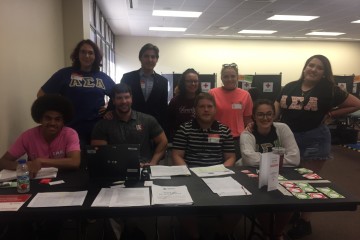University Staff to Provide Increased Oversight Over Student Organization Programming
Homecoming to be organized by committee of student organizations
Beginning in Fall 2016, student organizations at Frostburg State University will be required to collaborate extensively with Lane University Center Staff and the Department of Student and Community Involvement when planning large-scale, high risk, and late night programs, according to a memo from Bill Mandicott, Assistant Vice President for Student and Community Involvement (SCI).
“After working with our organizations for years, our professional staff recognize that most of our student leaders lack the knowledge and/or skills to meet the challenges of event planning in the 21st century,” Mandicott said. “Virtually all of these events present themselves as high risk for both the University and the participants. While the Dept. of Student and Community Involvement generally supports our student’s programming efforts, we also recognize that programming such events on college campuses today requires an updated set of policies, procedures and practices that can make the difference between success and calamity.”
The memo also explained that late night events frequently require Lane Center staff to work long hours, supervising these events in addition to fulfilling the their day-to-day job requirements.
Subsequently, Mandicott listed a handful of new and updated policies in his memo.
Most notably, the organizing of Homecoming will be handled by a committee of organizations, instead of by any one organization alone. In 2015, Black Student Alliance organized Homecoming. Before that, SGA was responsible for Homecoming.
“We are establishing a collaborative Homecoming Planning Committee comprised of students representing the major student organizations that have contributed to Homecoming events (i.e. SGA, BSA, UPC, LUC, Greeks) that will be chaired by our Director of Student Activities and Greek Life (ex officio) and charged with the planning and implementation of the Homecoming Dance and the Pep Rally,” Mandicott wrote.
Students will retain control over the programming of these events.
All expenses and revenue – including SGA’s programming subsidy – associated with these events will be managed by this committee.
Revenue from these events will go back into this special account and may be used for “supporting not only the current inventory of student events but other programming efforts designed to expand opportunities for students throughout the Homecoming weekend,” according to the memo.
Lane Center Staff will be more involved in the scheduling of late night dances, and the schedule of events will depend on staffing capabilities and venue availability. Mandicott pointed out that some student organizations “can’t pay their bills” as a result of holding frequent events with “variable” attendance.
Additionally, “Any student organization that plans on booking and producing a dance/concert/late night event is required to meet with SCI staff to seek event approval; demonstrate financial solvency for the event; review standard booking practices to ensure the University is protected from potential liability issues; and set out a plan of action for implementing the day of show requirements,” the memo said.
These policies were vetted and approved by the university police, according to the memo.
“We look forward to meeting with SGA and the other student organizations impacted by this structural and programmatic change as soon as possible to begin discussing and seeking approval for the actual Committee structure from SGA,” Mandicott wrote. “These changes will allow for Student and Community Involvement to continue to provide the necessary support to our student organization initiatives in the coming months as well as provide a structure from which Homecoming activities can be effectively managed and funded in the future.”




